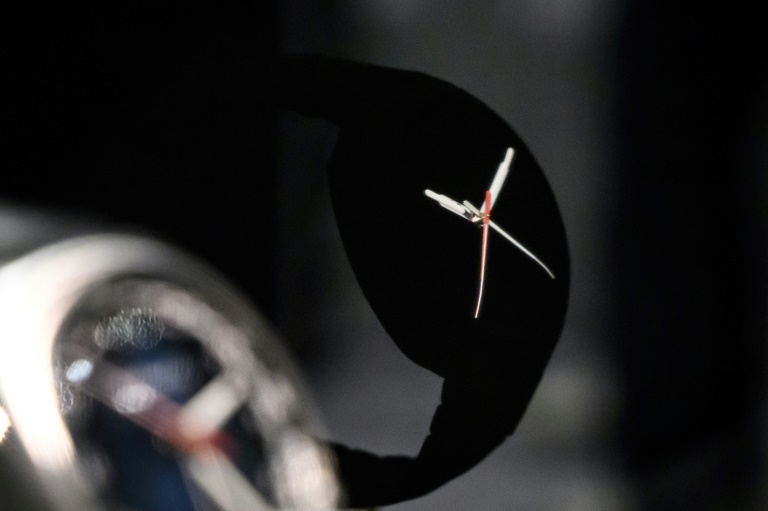Lab-made diamonds, recycled plastic and 3D printing: this year’s Geneva watch fair was teeming with timepieces crafted from new materials, aimed at seducing a new generation of luxury watch connoisseurs.
H. Moser, a niche brand producing 2,000 watches a year for wealthy collectors, this year presented a watch covered in Vantablack, a super-black coating that absorbs nearly all light.
Perched against a black background, the watch, which is still in the concept stage, creates the illusion of a black hole, with only the coloured hands visible to the naked eye.
The material, consisting of carbon nanotubes and made by NanoSystems, is considered the darkest pigment in the world.
“I wanted to bring something different than what will be on display in shop windows three months from now,” company chief Edouard Meylan told AFP at the Watches and Wonders fair.
“I wanted to show the future of materials,” he said adding that he had aimed to provide a view to how the watch industry might look five years down the line.
While the luxury brand has already used Vantablack in its clock faces, this exhibit model is completely covered.
For now, it cannot be touched since the material could lose its properties. More work is needed before it can actually be worn.
– Handcrafted technology –
Black is in high demand this year with new luxury virtuosos, according to Vincent Gregoire, who heads men’s fashion and accessories for the Parisian fashion consultancy NellyRodi.
“This is a clientele that wants beauty, hyper-luxury, with materials of the future, full of technology, but expertly handcrafted,” he said.
Their taste evokes the “Anish Kapoor universe”, he said, referring to the British sculptor who sparked a scandal in 2016 when he bought the exclusive right to use Vantablack in the art field.
A new generation of luxury lovers is emerging, Gregoire said, including a category of “agitators” who are fans of street culture and salvaging, and who want to use their purchasing power for “activist action”.
At a stand dedicated to innovation, the Oris brand is showing off how it recycles plastic waste, shredding it to make a material that resembles multi-coloured marble for its clock faces.
– Lab diamonds-
Tag Heuer, owned by French luxury group LVMH, has meanwhile broken an industry taboo by, for the first time, using diamonds made in a laboratory in one of its flagship models.
These diamonds, crafted from chemical deposits, have not been used to replace their shiny, mine-derived peers.
Instead, they have been chosen to explore how the new technology, which can produce uniquely shaped stones, can provide the dial with a new light-catching texture.
The brand hopes this new technology will allow it to explore new possibilities while remaining firmly anchored in high-end luxury.
This watch carries a price tag of 350,000 Swiss francs ($380,000, 345,000 euros).
“Lab diamonds have a place in the market,” said Tobias Kormind, head of online jewellery retailer 77Diamonds, enthusing over the watch displayed on Tag Heuer’s website.
“People buy lab diamonds for many reasons, some for affordability reasons, some for environmental reasons,” he said.
He stressed though that “over the long term, natural diamonds are the ones that remain rare and investable.”
Cartier’s stand certainly sparkles with plenty of natural diamonds.
But the jeweller, owned by Richemont, has also dabbled in new technologies this year.
Using 3D printing, it has created a new collection called “Coussin”, with a casing that cedes slightly to pressure before plumping back to its initial shape, like the cushion it is named after.











